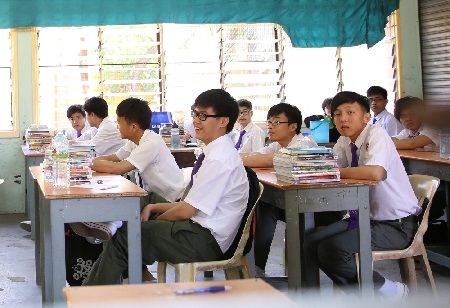-
- Malaysia amends Education Act 1996 to make secondary schooling compulsory for all children residing in the country.
- New Section 32A mandates legal obligation on parents to register children; non-compliance may lead to fines or imprisonment.
- Education Minister stresses aid over punishment, ensuring no child is left behind while addressing dropouts, exemptions, and enforcement.
The Dewan Rakyat approved the Education (Amendment) Bill 2025, which widens the definition of 'compulsory education' in the 1996 Education Act to cover secondary schooling. The change also adds a new provision, Section 32A, authorizing the Education Minister to make secondary education compulsory for all Malaysian children living in the country.
It provides that parents are bound by law to register their children in both the primary and secondary institutions, unless they are officially exempted. Parents who neglect to do so could be fined up to RM5,000, jailed up to six months, or both if convicted under the new Section 32A(4).
The amendment also prescribes penalties for failure to comply and empowers the minister to make further regulations on enforcement and exemptions. It also amends provisions regarding primary school registration, mandating parents to register children who have attained the age of six by Jan 1 of any particular academic year.
Education Minister Fadhlina Sidek informed the Lower House on Wednesday (July 30) that the bill is meant to enhance learning obligation instead of proposing punitive actions. The intent of this amendment is not punishment, but education to make sure no child gets left behind.
"The priority of the government is to induce a sense of responsibility in parents and guardians to keep their children in school, to ensure that every child's right to education is maintained", she said.
She said the ministry is also working to enhance community awareness and strengthen support systems to deal with dropout and absenteeism issues.Earlier in the debate, Cha Kee Chin (PH-Rasah) also welcomed the amendment, hailing it as 'bold, progressive and long overdue'.
But he also called on the government to confirm whether the law would include children of mixed-nationality parents, non-citizen children and those in private, Chinese independent or homeschooling environments. In reply, Fadhlina indicated that homeschooling would be taken into consideration on a case-by-case basis, depending on the individual child's needs.
"I'm willing to consider the manner in which we can provide the justification, space and opportunity for these children with no discrimination", she added.
In relation to enforcement, Cha suggested highlighting awareness and outreach over punishment. If implemented well, this could improve SPM attendance rates and close dropout gaps between lower and upper secondary levels", he continued.
Teresa Kok (PH-Seputeh) urged the Education Ministry to solve the root of student dropouts first before implementing amendments to make secondary school compulsory. "Most students drop out because of poverty, family issues or lack of interest in studies", she said.
Also Read: Sharjah Private Education Authority Unveils 'Itqan' Programme Results
Kok cautioned that it is unfair and costly to punish poor parents. She also asked how the law would extend to homeschooled children, slow learners and those in private schools. "Reform must be on curriculum and school improvements, rather than punishing legally", she said, and added that slow learners could be permitted to repeat a year in order to catch up. On issues of poverty, Fadhlina Sidek emphasized that the ministry had considered the issue and would prioritize aid over punishment.
“Punitive measures are not the core of this bill our focus is on providing assistance, including 18 forms of aid such as scholarships and school-related support like uniforms, to ensure children remain in school”, she said.
Datuk Dr Radzi Jidin (PN-Putrajaya) called for clarity on how the amendment will affect students in unregistered private institutions, including pondok and tahfiz schools.
"Will these pupils be automatically exempted under Section 32A(3), or do parents have to apply separately"? he asked, citing a provision whereby the minister (the minister in charge of education) could exempt any pupil or group of pupils from compulsory education, either unconditionally or conditionally, by gazetting an official order.
On this, Fadhlina said all registered private schools, including religious schools, are covered by the provisions of the Education (Amendment) Bill 2025. "We are in talks with unregistered institutions to get them to register so we can have a uniform curriculum and deal with problems such as bullying if they are not registered, the legal onus will be on the parents, and that's an issue we're trying to sort out", she said.
🍪 Do you like Cookies?
We use cookies to ensure you get the best experience on our website. Read more...

